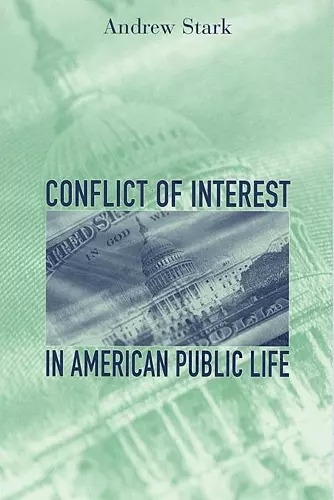Conflict of Interest in American Public Life
Format:Paperback
Publisher:Harvard University Press
Published:15th Oct '03
Currently unavailable, and unfortunately no date known when it will be back

An arrestingly original interpretation of conflict of interest. Stark earns his theory the hard way, the right way: he immerses himself in legal decisions, political conflicts, bureaucratic policy memos, you name it. Working from the ground up, he offers an elegant structure full of novel and mischievous insights. The book belongs on the shelves of lawyers, politicians, and journalists--it represents a powerful new way of working on ethics and policy. -- Don Herzog, University of Michigan Law School Government officials are rightly held to high ethical standards because of their visibility, and hence their potential for teaching good or bad lessons about morality. Andrew Stark's book makes an important contribution to our thinking through the ethical issues at stake in crafting judgments and policies in this area. -- Steven Kelman, Kennedy School of Government, Harvard University
Stark draws on legal, moral, and political thought to analyze several decades of debate over conflict of interest in American public life. He offers new ways of interpreting the controversies about conflict of interest, explains their prominence in American political combat, and suggests how we might make them less venomous and intractable.
Ranging over a wide array of cases, Andrew Stark draws on legal, moral, and political thought--as well as the rhetoric of officeholders and the commentary of journalists--to analyze several decades of debate over conflict of interest in American public life. He offers new ways of interpreting the controversies about conflict of interest, explains their prominence in American political combat, and suggests how we might make them less venomous and intractable.
Stark shows that over the past forty years public opinion has shifted steadily toward an objective conception of conflict: instead of considering case-by-case motivations, we have adopted broadly prophylactic rules barring a variety of circumstances with no regard for whether individuals facing those circumstances would be moved in culpable ways. At the same time, we have shifted toward a subjective conception of interest: where we once focused narrowly on money, we now inquire into various commitments individuals might pursue in ways that could impair their judgment.
In exploring the consequences of these twin migrations--the passage of "conflict" from a subjective to an objective understanding; the transformation of "interest" from an objective to a subjective conception--the author aims to make our debates over public ethics less vexatious for officials, and more lucid for citizens.
An arrestingly original interpretation of conflict of interest. Stark earns his theory the hard way, the right way: he immerses himself in legal decisions, political conflicts, bureaucratic policy memos, you name it. Working from the ground up, he offers an elegant structure full of novel and mischievous insights. The book belongs on the shelves of lawyers, politicians, and journalists--it represents a powerful new way of working on ethics and policy. -- Don Herzog, University of Michigan Law School
Stark brings back to our attention a host of Presidential advisers, Cabinet officers and lawmakers who have been accused of, or forced to resign over, conflict of interest...Stark does not sit in judgment on particular individuals; instead, he exposes the laws and particular cases to remorseless and clever reformulation and reinterpretation. In so doing, he highlights the contradictions and inconsistencies of prosecutors and defendants, and those of critics and champions of regulation. The result is provocative and always stimulating. -- Tony Badger * Times Literary Supplement *
[This book is] perfectly poised to benefit from the country's cresting wave of conflict-of-interest outrage...The scandal of 'conflict of interest' as a moral notion, Stark recognizes, is that it's poorly named. All of us have interests that conflict. It's not logical or psychological conflict among them that we seek to eliminate in public officials and umpires. It's decision-making according to inappropriate criteria. -- Carlin Romano * Chronicle of Higher Education *
[Stark] argues that conflicts of interest, real or imagined, are rife these days because of a combination of 'legal liberalism' and 'political liberalism'...[He] probes such matters with great care and thoughtfulness. His prose is superbly readable, his analysis relentless...Among other things, he offers the reader the wry pleasure of watching all the tools of Oxford philosophy deployed to decipher a legal regime designed to prevent abuses by Chicago ward heelers and Washington lobbyists. -- John O. McGinnis * Wall Street Journal *
Government officials are rightly held to high ethical standards because of their visibility, and hence their potential for teaching good or bad lessons about morality. Andrew Stark's book makes an important contribution to our thinking through the ethical issues at stake in crafting judgments and policies in this area. -- Steven Kelman, Kennedy School of Government, Harvard University
- Nominated for Gladys M. Kammerer Award 2001
ISBN: 9780674012134
Dimensions: unknown
Weight: 422g
352 pages